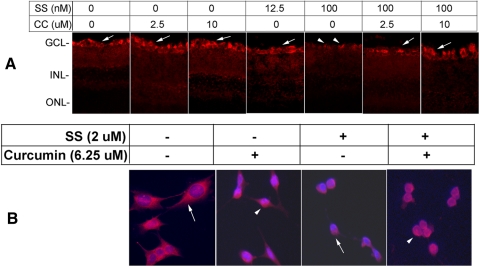Figure 9.
Curcumin attenuated SS-induced downregulation of NF-κB. Indicated concentrations of SS, curcumin (CC), or vehicle (DMSO) were injected into the vitreous humor of C57BL/6 mice, and NF-κB expression was determined (at 72 hours after injection) by immunofluorescence staining of retinal cross sections with antibodies against NF-κB (A). Immunofluorescence staining indicates that cells in the GCL expressed NF-κB constitutively (arrows). The results also indicate that higher concentrations (100 nM) of SS reduced the expression of NF-κB (arrowheads), whereas lower concentrations (12.5 nM) had little effect. Furthermore, immunofluorescence analysis indicated that, whereas animals injected with higher concentrations of SS expressed very low levels of NF-κB, animals injected with higher concentrations of CC (10 μM) expressed NF-κB similar to that observed in untreated animals or animals treated with CC alone. To determine whether curcumin activates NF-κB in vitro, RGC-5 cells were left untreated or were treated with SS (2 μM) or SS and curcumin (6.25 μM) for 48 hours. At 48 hours after treatment, NF-κB expression was assessed by immunostaining. Results presented in (B) indicate a low level of NF-κB immunoreactivity was present constitutively in the cytoplasm of the RGC-5 cells that were left untreated (arrow); NF-κB expression was reduced further in cells treated with SS (arrow). In contrast when cells were treated with curcumin alone or SS plus CC, NF-κB expression was observed in the nucleus of RGC-5 cells (arrowhead).

